How Event Production Works: A Comprehensive Take A Look At the Refine
Event production is a complicated and organized process that calls for careful preparation and execution. It begins with developing clear objectives and understanding the target market. Each action, from budgeting to place option, plays a critical duty in making certain success. As the procedure unravels, different elements must straighten flawlessly. Yet, the subtleties of this complex operation frequently go unnoticed. What are the crucial stages that add to an unforgettable event?

The Initial Planning Stage
When beginning on event production, mindful preparation is vital to guarantee a successful result. The preliminary drawing board works as the structure for all succeeding initiatives. Throughout this phase, event manufacturers have to specify the event's objective and purposes plainly. Recognizing the target market aids customize the experience and messaging, ensuring importance and engagement.Producers have to additionally take into consideration the event layout, whether it be in-person, digital, or crossbreed, as this will certainly affect different logistical aspects. Selecting a suitable date and place is critical, as it influences accessibility and availability.Furthermore, assembling a dependable team is basic for separating obligations and enhancing communication. Establishing a timeline with landmarks warranties all tasks are completed on time. This phase includes complete research study, including recognizing possible difficulties and devising approaches to alleviate dangers. Ultimately, a well-structured first planning phase establishes the tone for a successful event production trip.

Budgeting and Source Allotment
In event production, reliable budgeting and resource appropriation are important for success - event production charlotte. Establishing economic parameters establishes the foundation for all succeeding decisions, while source distribution methods guarantee that every element of the event is properly supported. With each other, these aspects help preserve control over expenditures and maximize using offered resources
Developing Financial Parameters
Developing monetary criteria is vital to the success of any type of event production, as it establishes the structure for effective budgeting and source allocation. This process starts with specifying the overall budget plan, which encompasses all elements of the event, consisting of venue expenses, wedding catering, and marketing. By determining readily available funds, event planners can prioritize expenditures and designate sources accordingly. Furthermore, it is vital to conduct extensive marketing research to prepare for potential costs and determine funding resources, such as sponsorships or ticket sales. Developing clear economic criteria additionally aids in risk management, enabling coordinators to reserve backup funds for unforeseen expenditures. Inevitably, a distinct spending plan functions as a roadmap, leading the event production group in the direction of attaining their objectives while keeping economic control.
Source Circulation Approaches
Reliable source circulation methods are crucial for maximizing the impact of an event while sticking to spending plan restrictions. Successful event production needs a precise strategy to budgeting and resource allotment. Coordinators need to prioritize important elements such as venue, wedding catering, and modern technology, making sure that funds are designated to areas that enhance participant experience. An in-depth budget plan should outline anticipated costs and identify locations for prospective cost financial savings, such as discussing with vendors or discovering sponsorship chances. Additionally, tracking expenses throughout the planning process assists avoid overspending. By employing calculated source circulation, event producers can supply an unforgettable experience while keeping financial responsibility, eventually adding to the total success of the event.
Venue Option and Logistics
Selecting the right location is vital to the success of any kind of event, as it sets the phase for the total experience. Venue selection entails examining different aspects, including capacity, accessibility, and location. Planners must consider the target market and the nature of the event, making certain the venue straightens with the event's goals.Logistics play a considerable role in this process, including setups for seating, audiovisual devices, and catering solutions. An appropriate venue ought to promote smooth circulation for participants and team, enhancing engagement.Additionally, reviewing prospective locations for features like car park, bathrooms, and fire escape is necessary for safety and convenience. The timeline for protecting the location is likewise important, as popular areas may book promptly - event production charlotte. Detailed planning and prompt execution can ultimately add to a smooth event experience, making place choice and logistics basic components of effective event production.
Innovative Principle Advancement
While the location establishes the physical stage, innovative principle growth shapes the event's identification and narrative. This procedure starts with recognizing the event's objective and target audience, permitting event manufacturers to develop a compelling theme that resonates with participants. Conceptualizing sessions usually consist of diverse perspectives, fostering cutting-edge concepts that align with the event's goals.Once a theme is developed, visual elements such as shade schemes, signage, and decor are made to improve the general atmosphere. Narration methods might likewise be integrated to develop an appealing journey for individuals, ensuring a memorable experience. In addition, considerations regarding amusement, tasks, and interactive components are straightened with the chosen principle, strengthening the motif throughout the event.Ultimately, efficient creative idea development warranties that every aspect of the event functions cohesively, leaving a long lasting impact on guests and meeting the event's goals. This fundamental work prepares for subsequent preparation and implementation stages.
Teaming up With Vendors and Distributors
Successful event production depends upon reliable partnership with suppliers and suppliers. Choosing dependable companions, negotiating contracts successfully, and ensuring timely distributions are crucial actions in this procedure. Each of these factors contributes substantially to the total success and smooth execution of an occasion.
Picking Reliable Partners
Exactly how can event organizers assure a seamless production experience? Choosing trustworthy companions is important in accomplishing this objective. Event organizers must conduct complete study to identify suppliers and providers with a tried and tested record of quality. This includes checking references, evaluating portfolios, and examining client comments. Organizers need to focus on companions that show professionalism and reliability, timely communication, and a determination to work together. Building strong relationships fosters count on and enables quick problem-solving throughout the event. In addition, it is valuable to pick neighborhood suppliers who comprehend the venue and regional logistics. Ultimately, an effective event rests on the synergy between planners and their companions, making certain that every element of production runs smoothly and efficiently.
Negotiating Agreements Successfully
Efficient negotiation of contracts is an essential action in the partnership between event planners and their vendors and providers. This process entails clear interaction of assumptions, deliverables, and timelines. Planners should conduct extensive research on market prices and sector criteria to develop a baseline for negotiations. It is essential to develop a collective environment, urging open dialogue concerning terms, rates, and prospective backups. Coordinators need to likewise focus on recognizing the vendor's abilities and limitations to align their needs effectively. Adaptability can result in equally advantageous agreements, fostering long-term relationships. Crafting well-defined agreements that read the full info here consist of details performance metrics can aid ensure responsibility, eventually resulting in effective event implementation and fulfillment for all events included.
Ensuring Timely Deliveries
Prompt deliveries are vital for the smooth implementation of any kind of event, requiring diligent collaboration between coordinators and their suppliers and vendors. Effective communication is important, as it aids develop clear expectations concerning delivery routines, amounts, and details requirements. Organizers typically develop detailed timelines to outline vital turning points, ensuring all parties stay lined up throughout the procedure. Routine check-ins with vendors can assist recognize possible delays early, permitting proactive options. In addition, building solid relationships with reliable vendors promotes trust fund and responsibility, which can result in much better solution and prioritization. By focusing on these collective efforts, organizers can decrease disturbances, therefore enhancing the overall performance of event production and making certain that all necessary materials and services show up as prepared.
Marketing and Promo Approaches
While organizing an event, the success of marketing and promotion approaches can significantly affect presence and involvement. Efficient approaches usually consist of a combination of digital marketing, traditional advertising and marketing, and grassroots outreach. Using social media sites platforms permits real-time communication and targeted marketing, getting to particular demographics properly. Email advertising projects can further involve potential attendees with customized web content and reminders.Collaborations with influencers or industry leaders can also boost credibility and widen reach. Developing interesting material, such as videos or blogs, helps to create buzz and sustain rate of interest leading up to the event. In addition, leveraging early-bird discounts and exclusive advantages can incentivize ticket purchases.Promoting via conventional networks, such as posters or regional media, continues to be relevant, specifically in community-focused occasions. A thorough approach that integrates numerous strategies assurances optimum exposure and involvement, eventually contributing to the event's success and the creation of a remarkable experience for participants.
On-Site Execution and Monitoring
On-site implementation and monitoring are important parts that identify the general success of an event. Reliable control during the event ensures that all aspects straighten with the prepared program. Event managers manage logistics, consisting of supplier control, equipment arrangement, and guest services. Keeping track of timelines and addressing any unanticipated issues are fundamental for keeping a smooth experience.The staff plays a significant duty, as trained employees are liable for various jobs such as registration, information dissemination, and technical support. Communication amongst employee is imperative; it promotes a joint atmosphere and allows quick resolution of challenges.Additionally, security methods must be followed, safeguarding the wellness of all participants. Post-event analyses are likewise part of on-site management, providing understandings for future improvements. By concentrating on these elements, event producers can develop remarkable experiences that satisfy or surpass participant assumptions while achieving the event's objectives.
Frequently Asked Questions
Just how Do I Select the Right Event Motif?
Choosing the best event theme includes taking into consideration the target market, event function, and location. Researching current patterns and gathering input from stakeholders can additionally inspire creative ideas that reverberate and produce a memorable experience.

What Are Common Errors in Event Production?
Typical mistakes in event production frequently include poor planning, poor communication amongst staff member, spending plan mismanagement, disregarding to check my blog consider the target market's demands, and failing to conduct a comprehensive post-event assessment for future renovations.
Just How Can I Measure Event Success?
To determine event success, one can analyze attendee satisfaction, involvement degrees, spending plan adherence, and post-event feedback. Key efficiency indicators, such as ticket sales and social media interactions, also give important understandings into general effectiveness.
What Should I Do if It Rains on the Event Day?
In case of moisten the day, the coordinator must implement backup plans, such as protecting tents or moving tasks inside. Interaction with guests concerning changes is important to guarantee look at this web-site a smooth experience in spite of climate obstacles.
Exactly How Can I Make Sure Participant Involvement Throughout the Event?
